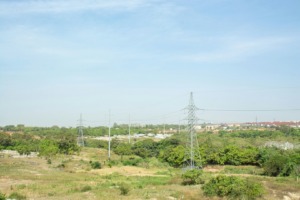Today’s ESG Updates
- EU Banks to Exit Net-Zero Climate Alliance: Major EU banks are quietly withdrawing from the Net-Zero Banking Alliance, citing political backlash from the U.S.
- Reform of EU Waste Management Could Cut Carbon Emissions: A new EU study found that improved waste sorting and recycling could save €136 billion annually and significantly reduce emissions.
- Nigeria Commits $2.61 Billion to Energy Sector: Nigeria will refinance energy sector debts to stabilize electricity access and attract new investment after a decade of unpaid invoices.
- Albania Looks to AI to Join the EU: Albania plans to utilize AI to combat corruption, boost transparency, and expedite its EU accession process.
Featured ESG Tool of the Week:
Klimado – Navigating climate complexity just got easier. Klimado offers a user-friendly platform for tracking local and global environmental shifts, making it an essential tool for climate-aware individuals and organizations.
Climate alliance in vulnerable position amid changing U.S. climate policies
Under the Trump administration, U.S. banking institutions have withdrawn from the Net-Zero Banking Alliance (NZBA) due to concerns about anti-oil accusations, blacklists, and lawsuits. As the influence of climate policies in the United States has spread across the Atlantic and into Europe, many major banks are beginning to follow suit. The Net-Zero Banking Alliance is focused on decarbonizing global finance and currently holds $41 trillion in assets across 125 members. A spokesperson for Germany’s Deutsche Bank said that the institution’s net-zero targets have not changed; however, the bank is “monitoring current developments and will assess them.” Quietly departing banks claim they still support sustainable finance, but governance concerns persist among investors. Banks that have expressed their continued commitment to the NZBA include Denmark’s Danske Bank, the Netherlands’ ING Groep, and Sweden’s Swedbank. Companies committed to achieving net-zero targets should utilize ESG tools to track their progress.
***
Further reading: Banking’s Ailing Climate Coalition Loses Ground in Europe
Redesigning waste management could lower emissions in EU
 The EU wastes €304 per citizen each year on poor waste management. Photo Credit: Alfonso Navarro
The EU wastes €304 per citizen each year on poor waste management. Photo Credit: Alfonso Navarro
Despite leading the world in waste management operations, the European Union could further improve its systems to decrease carbon emissions. The Joint Research Centre of the European Commission and the Technical University of Denmark have released a scientific paper detailing waste generation and disposal across the EU. One of the key findings was the poor sorting of waste, with approximately 50% of generated household waste ending up in the mixed bin. The study used Life Cycle Assessment (LCA) and Life Cycle Costing (LCC) to evaluate environmental and economic impacts, revealing a societal cost of €136 billion annually (or €304 per EU citizen). According to the study, only metals are properly disposed of in the EU. The research emphasizes the importance of better collection and recycling.
***
Further reading: Proper waste management can significantly reduce greenhouse gas emissions in the EU
Nigeria invests $2.61 billion in energy sector
 The continent’s most populous country is seeking to revamp its energy sector. Photo Credit: Francis Tokede
The continent’s most populous country is seeking to revamp its energy sector. Photo Credit: Francis Tokede
The Finance Minister of Nigeria, Olawale Edun, has approved a plan to refinance 4 trillion naira ($2.61 billion) to repay debts in the energy sector. The government must repay 27 power companies for outstanding invoices going back 10 years. The enormous debt has halted investment in the industry; therefore, its repayment will help improve the country’s energy supply and stabilize the power grid. To spread out repayment over time, the government is likely to introduce bonds and other payment instruments. This follows the country’s introduction of a 35% reduction in electricity subsidies in April and an increase in usage tariffs. The government is expected to save 1.1 trillion naira (approximately $718.58 million) annually under these new reforms.
***
Further reading: Nigeria approves $2.6 billion electricity sector debt refinancing plan
Albania to use AI to accelerate EU accession
 AI could replace humans in the Albanian government. Photo Credit: Igor Omilaev
AI could replace humans in the Albanian government. Photo Credit: Igor Omilaev
Last month, Albania’s Prime Minister Edo Rama claimed that AI could be a tool to increase transparency and prevent corruption. He said that the Albanian government could see AI replacements, stating, “One day, we might even have a ministry run entirely by AI.” Ben Blushi, a former Albanian politician and writer, mused that having an AI-run state is a real possibility. He said, “Societies will be better run by AI than by us because it won’t make mistakes, doesn’t need a salary, cannot be corrupted, and doesn’t stop working.” As the country has often fought with corruption, integrating AI into the government could expedite the country’s integration into the EU. While it cannot complete the entire process on its own, AI can offer transparency and assist with technical translation, thereby accelerating the integration process. The country also intends to utilize AI for digitally identifying citizens, improving healthcare and education, and combating speeding nationwide.
***
Further reading: Albania turns to AI to beat corruption and join EU
Editor’s Note: The opinions expressed here by the authors are their own, not those of impakter.com — In the Cover Photo: Deutsche Bank Tower in Frankfurt, Germany — Cover Photo Credit: cmophoto.net
